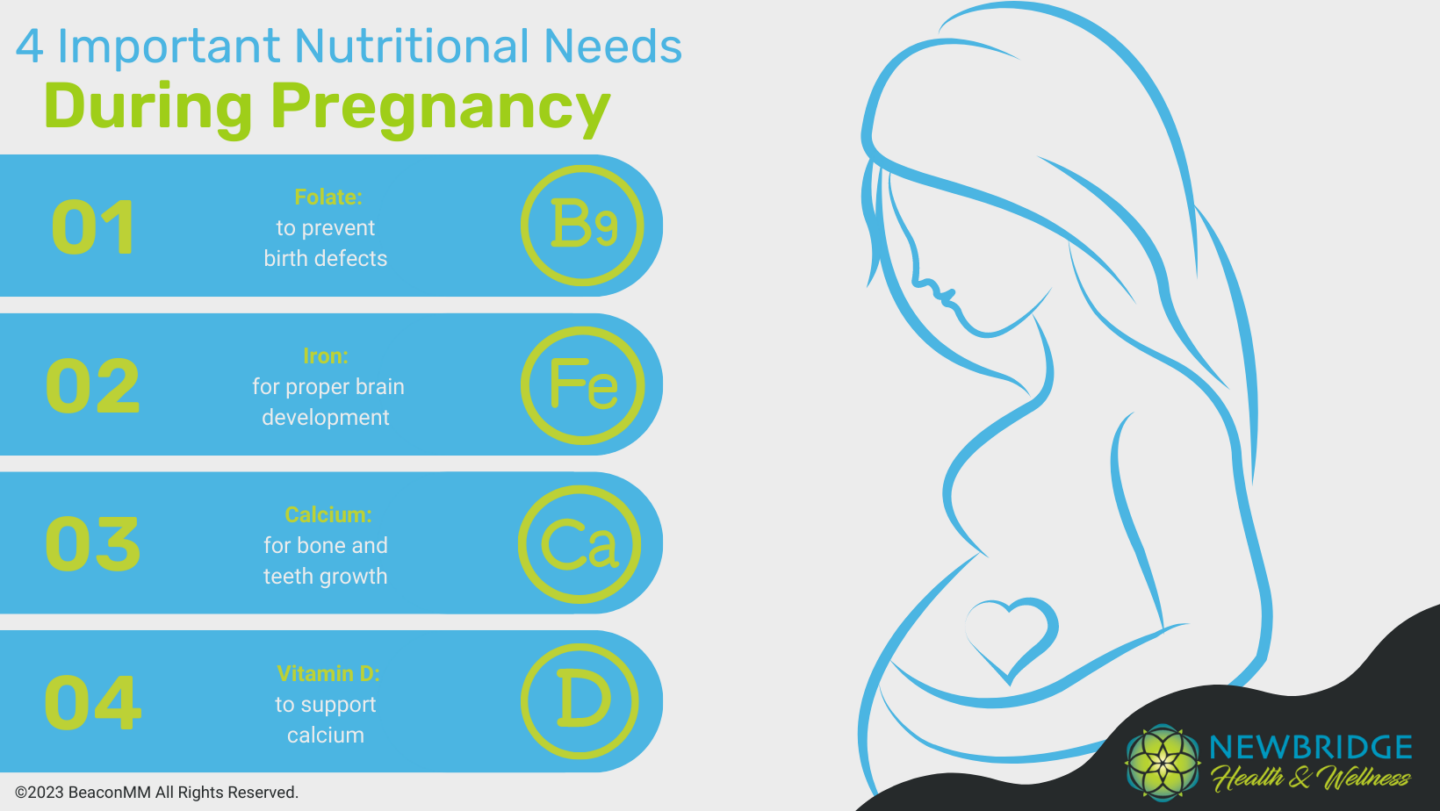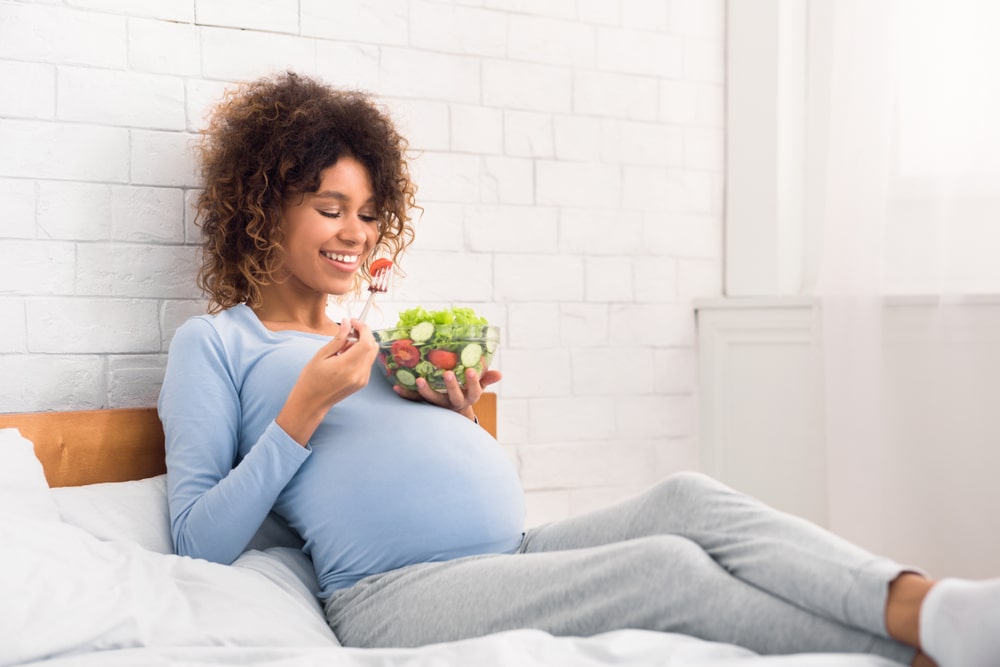As a pregnant mother, your nutrition is more important than ever. After all, you’re no longer just eating for yourself – you’re eating for two. And this makes nutrition during pregnancy extremely critical for the proper development of your child while in the womb.
For a healthy pregnancy, making excellent food choices is going to be one of the first steps in ensuring that you’re meeting your and your child’s nutritional needs. Along with following the advice of your doctor, making sure you meet these nutritional requirements through toxin-free and nutrient-dense choices is much more important than what most expecting mothers realize.
But what type of foods should you eat while you’re pregnant? What are the best vitamins, minerals, and fatty acids that will ensure the proper development of your child? And are there any food choices that you should stay away from?
Here we’ll discuss several nutritional options and explore why each is important for your child’s development and for having a healthy pregnancy.
Are you an expecting mother and want to learn more about proper nutrition? Reach out to Newbridge Health and Wellness today and talk to an expert in this area so you can learn what you can do to help prevent mental and physical illness and improve optimal development for your baby by making the right choices during pregnancy.
What About Preconception Nutrition?
Perhaps you’re planning to get pregnant. If so, in addition to nutrition during pregnancy, nutrition during pre-conception for both the man and woman is also an important factor that many couples don’t really think about when trying to get pregnant. However, nutrition and fertility go hand-in-hand. In addition, the pesticides, herbicides, fungicides, and chemicals your baby is exposed to in utero affect their future health, so choosing organic and non-gmo is always a healthy choice.
Not only does what you eat affect your body in many ways, but it can also affect your chances of getting pregnant. The good news is most of the foods that support optimal health and well-being are also the foods that you should eat when trying to conceive.
A few healthy food choices that can help increase fertility are:
- Whole organic, unprocessed foods
- Organic beans and lentils
- Organic fresh fruits and vegetables, including asparagus, wild blueberries
- Healthy fats – avocados, nuts, seeds, olives, extra virgin olive oil, wild-caught caviar and fish roe/fish from clean waters, etc.
- Organically-raised, 100% grass-fed meats and small amounts of low-mercury, wild-caught fish and oysters from clean waters (check your lakes/local bodies of water to ensure the fish from them are not high risk for mercury, PCBs, dioxins, and other toxic chemicals)
- Organic seeds and nuts, especially pumpkin seeds
- Quinoa, rice, wild rice, and other whole, unprocessed grains
- Organic, grass-fed, straight-from-the-farm (if possible) whole yogurt and kefir
While as a woman you want to increase your chances of getting pregnant, you’re only half of the equation. During a natural conception, men obviously play a critical part in this process. As such, it’s also important for males to eat a proper diet to ensure that sperm quality is optimized for better fertility and a healthy baby. Dad’s health, lifestyle, and diet matter too!
For men and women, avoiding processed meats, alcohol, tobacco, and caffeine should be a standard in the preconception phase. In addition, a diet rich in fruits, nuts, vegetables, whole grains, and healthier fish is also ideal for better sperm quality due to zinc and other critical nutrients.
Finally, if you’re planning on getting pregnant, increasing your folate intake (not folic acid) is going to be essential for building up adequate levels in the body while pregnant. Basically, babies are folate thieves, and they need this essential nutrient for proper development, and because it offers the fetus protection against possible birth defects such as spina bifida, other mid-line defects, and methylation-related health concerns.
Nutritional Needs During Pregnancy

Once you’re pregnant, not only are food choices important, but you also want to ensure that you’re meeting nutritional requirements for the proper development of your baby. And these include essential vitamins and minerals and antioxidants.
Folate and other B vitamins
As mentioned, folate – a B vitamin – ideally in its natural and highly bioavailable form, is critical for helping to prevent birth defects and aiding in healthy brain and nervous system development. And while you are in the preconception phase, your health care practitioner or dietician/nutritionist may recommend supplementing with 5-methyl-tetra -hydro-folate (5MTHF) or folinic acid per day. During pregnancy (and when breastfeeding), your doctor may recommend personalized amounts of folate per day based on your personal needs and genetics. All B vitamins are important to the health of babies, but folate is especially important.
Keep in mind that it’s extremely difficult to get enough folate through your diet alone. As such, high-quality daily supplements containing bioavailable forms of folate, B12, B6, and other B vitamins are very important.
DHA
Increased intake of DHA (and EPA) has been shown to prevent pre-term labor and delivery, lower the risk of preeclampsia, and may increase birth weight. DHA aids in healthy brain and eye development as well! Ask your healthcare provider or dietician/nutritionist about appropriate dosing for you.
Calcium
During pregnancy, calcium and other minerals are the primary components for building your baby’s teeth and bones. In addition, calcium also helps to reduce serious medical conditions that can develop during pregnancy, such as preeclampsia — a condition that can cause your blood pressure to increase suddenly.
Consuming high-quality calcium for pregnant mothers is recommended, and pregnant teens might need a slightly higher amount than other mothers. Getting as much calcium from your diet is ideal, from foods like boy choy, spinach and other leafy greens, almonds, and organic, unsweetened, and fermented grass-fed dairy products (yogurt and/or kefir).
In addition to calcium, vitamin D3, and vitamin K2 are also needed to help build your baby’s bones and teeth. And it’s recommended that all women are taking enough vitamin D each day in order to bring their blood level up to acceptable levels, which can vary for each person, depending on their state of health, sun exposure, skin type, and vitamin D receptor genetic expression
Iron
As your pregnancy progresses, the amount of blood in the body increases. As a result of this, you and your baby will need more iron – an essential part of brain development and overall growth of your baby.
It’s often recommended that pregnant mothers supplement with iron each day. But you should always follow the advice of your health care provider and/or dietician/nutritionist when taking supplements, and for nutritional guidance in general. Many prenatal supplements are contaminated with lead and cadmium, among other potential toxins, so choosing prenatal supplements that have been independently 3rd-party tested for toxins and contaminants is recommended.
Protein
You’ll also need to consume plenty of protein (at least 100 grams from high-quality sources). Consider keeping hardboiled organic pasture-raised eggs in the refrigerator for an easy and nutritious snack rich in protein, choline, and many other important nutrients.
Water
Stay hydrated by drinking at least half of your weight in ounces of purified water throughout the day. So, if you are 150 pounds, then you should be drinking at least 75 ounces of filtered water a day. Drinking sweetened beverages or “diet” beverages is not recommended.
Too much or not enough vitamins?
It’s important to take only recommended amounts of any supplement, as recommended by a health care professional with additional training in nutrition and supplementation. For example, too much Vitamin A can cause birth defects (though too little vitamin A is also a problem), and too much iron can lead to complications as well.
What Foods and Beverages Should I Avoid During Pregnancy?
Just as it’s vital for your baby to get the right nutrition and vitamins, minerals, fatty acids, and antioxidants during pregnancy, it’s also equally important to avoid pesticides, herbicides, fungicides, and certain foods as well. Therefore, eating organic and unprocessed is important, and though it may be obvious that some foods are bad for both you and your baby, others are not as obvious.
For example, while small amounts of oily fish such as wild-caught (never farm-raised) salmon can be a great source of protein and nutrients, fish that may contain high levels of mercury, dioxins, PCBs, and other toxins can be extremely harmful to you and your baby. Large predatory fish such as tuna, swordfish, shark, and tilefish as well as fish caught from waters with unacceptable levels of toxins, which unfortunately are many these days, is very concerning.
In addition, there are several foods that could possibly cause foodborne illnesses without you realizing it. A few of these include:
- Raw sprouts from a grocery store that might not be fresh might possibly be a problem, but fresh well-attended home-grown sprouts are nutrient-dense and recommended!
- Unpasteurized cheeses could potentially be an issue
- Pre-made salads or salad mixes (better to make yours fresh at home!)
- Deli and other processed meats (generally not good for anyone)
While many of the foods you normally consume may contain enough vitamins and other nutrients, fruits, and vegetables today do not contain as many nutrients as they did in the past due to changes in farming practices and the degradation of soil and its microbial constituents.
It is important to consult with your healthcare practitioner about any foods, beverages, or supplements that you’d normally eat, in order to keep you and your baby safe.
Finally, alcohol and caffeine may seem like obvious things to avoid. And many medications should not be taken during pregnancy. Even medications previously thought to be safe, such as acetaminophen, are now receiving more scrutiny.
Unfortunately, many women still believe they can get away with having a glass of wine or two or drinking several cups of coffee per day. The truth is that there is no known safe amount of alcohol for a woman during pregnancy, and the evidence is becoming stronger in regard to avoiding alcohol even when you aren’t pregnant. Time to check out the non-alcoholic cocktails (but watch out for the sugar)! In addition, too much caffeine can be harmful to your baby, though moderate amounts of organic coffee may be safe.
Things to Remember for a Healthy Pregnancy
Along with ensuring that you’re eating the right foods and avoiding foods that could be harmful to you and your baby, you’ll also need to remember a few additional steps.
First, staying active is a great way to facilitate a healthy pregnancy. Though you may want to skip dodgeball practice, staying active on a daily basis, outside in nature if able, can work wonders for your health and the health of your baby.
While moderate exercises such as running or jogging will be great at the beginning of your pregnancy, as your body changes, you will want to change your activities accordingly. For example, instead of jogging, perhaps switch to swimming, brisk walking, or light hiking as your pregnancy progresses and you gain more weight. Prenatal yoga is also a great choice.
You’ll also want to ensure that you’re not engaging in strenuous or dangerous activities such as lifting heavy weights or cleaning with toxic chemicals. But above all, always remember to eat the most nutrient-dense foods possible, in order to optimize the health of your baby and help prevent chronic health conditions. Follow the directions of your healthcare practitioner during your pregnancy.
Are you having trouble getting pregnant, or curious about the nutritional requirements your baby needs for optimal health and development during pregnancy, and/or do you want to try to create the happiest and healthiest baby ever? Contact Newbridge Health and Wellness today and talk to a professional.


